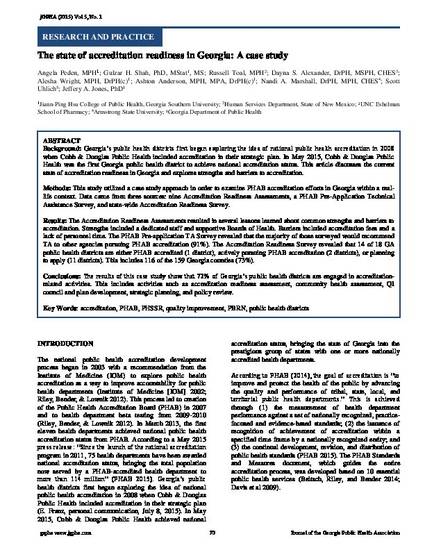
Background: Georgia’s public health districts first began exploring the idea of national public health accreditation in 2008 when Cobb & Douglas Public Health included accreditation in their strategic plan. In May 2015, Cobb & Douglas Public Health was the first Georgia public health district to achieve national accreditation status. This article discusses the current state of accreditation readiness in Georgia and explores strengths and barriers to accreditation.
Methods: This study utilized a case study approach in order to examine PHAB accreditation efforts in Georgia within a reallife context. Data came from three sources: nine Accreditation Readiness Assessments, a PHAB Pre-Application Technical Assistance Survey, and state-wide Accreditation Readiness Survey.
Results: The Accreditation Readiness Assessments resulted in several lessons learned about common strengths and barriers to accreditation. Strengths included a dedicated staff and supportive Boards of Health. Barriers included accreditation fees and a lack of personnel time. The PHAB Pre-application TA Survey revealed that the majority of those surveyed would recommend TA to other agencies pursuing PHAB accreditation (91%). The Accreditation Readiness Survey revealed that 14 of 18 GA public health districts are either PHAB accredited (1 district), actively pursuing PHAB accreditation (2 districts), or planning to apply (11 districts). This includes 116 of the 159 Georgia counties (73%).
Conclusions: The results of this case study show that 72% of Georgia’s public health districts are engaged in accreditationrelated activities. This includes activities such as accreditation readiness assessment, community health assessment, QI council and plan development, strategic planning, and policy review.
Available at: http://works.bepress.com/nandi-marshall/8/

Copyright Statement: Copyright © Peden, et al. 2015. Originally published in jGPHA (http://www.gapha.org/jgpha/). This is an open-access article distributed under the terms of the Creative Commons Attribution Non-Commercial No-Derivatives License (http://creativecommons.org/licenses/by/4.0/), which permits unrestricted use, distribution, and reproduction in any medium, provided the original work ("first published in the Journal of the Georgia Public Health Association…") is properly cited with original URL and bibliographic citation information. The complete bibliographic information, a link to the original publication on http://www.gapha.jgpha.org/, as well as this copyright and license information must be included.